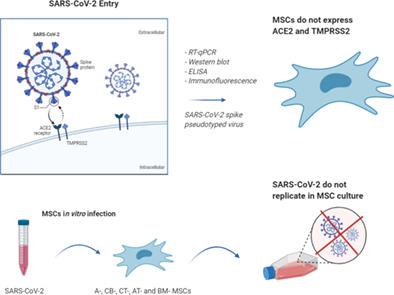当前位置:
X-MOL 学术
›
Stem Cells Transl. Med.
›
论文详情
Our official English website, www.x-mol.net, welcomes your
feedback! (Note: you will need to create a separate account there.)
Human mesenchymal stromal cells do not express ACE2 and TMPRSS2 and are not permissive to SARS‐CoV‐2 infection
STEM CELLS Translational Medicine ( IF 5.4 ) Pub Date : 2020-11-14 , DOI: 10.1002/sctm.20-0385 Maria A. Avanzini 1, 2 , Manuela Mura 3 , Elena Percivalle 4 , Francesca Bastaroli 5 , Stefania Croce 1, 6 , Chiara Valsecchi 1, 2 , Elisa Lenta 1 , Giulia Nykjaer 5 , Irene Cassaniti 4 , Jessica Bagnarino 1, 2 , Fausto Baldanti 4 , Marco Zecca 2 , Patrizia Comoli 1, 2 , Massimiliano Gnecchi 3, 5, 7
STEM CELLS Translational Medicine ( IF 5.4 ) Pub Date : 2020-11-14 , DOI: 10.1002/sctm.20-0385 Maria A. Avanzini 1, 2 , Manuela Mura 3 , Elena Percivalle 4 , Francesca Bastaroli 5 , Stefania Croce 1, 6 , Chiara Valsecchi 1, 2 , Elisa Lenta 1 , Giulia Nykjaer 5 , Irene Cassaniti 4 , Jessica Bagnarino 1, 2 , Fausto Baldanti 4 , Marco Zecca 2 , Patrizia Comoli 1, 2 , Massimiliano Gnecchi 3, 5, 7
Affiliation

|
Anti‐inflammatory and immune‐modulatory therapies have been proposed for the treatment of COVID‐19 and its most serious complications. Among others, the use of mesenchymal stromal cells (MSCs) is under investigation given their well‐documented anti‐inflammatory and immunomodulatory properties. However, some critical issues regarding the possibility that MSCs could be infected by the virus have been raised. Angiotensin‐converting enzyme 2 (ACE2) and type II transmembrane serine protease (TMPRSS2) are the main host cell factors for the severe acute respiratory syndrome‐coronavirus 2 (SARS‐CoV‐2), entry, but so far it is unclear if human MSCs do or do not express these two proteins. To elucidate these important aspects, we evaluated if human MSCs from both fetal and adult tissues constitutively express ACE2 and TMPRSS2 and, most importantly, if they can be infected by SARS‐CoV‐2. We evaluated human MSCs derived from amnios, cord blood, cord tissue, adipose tissue, and bone marrow. ACE2 and TMPRSS2 were expressed by the SARS‐CoV‐2‐permissive human pulmonary Calu‐3 cell line but not by all the MSCs tested. MSCs were then exposed to SARS‐CoV‐2 wild strain without evidence of cytopathic effect. Moreover, we also excluded that the MSCs could be infected without showing lytic effects since their conditioned medium after SARS‐CoV‐2 exposure did not contain viral particles. Our data, demonstrating that MSCs derived from different human tissues are not permissive to SARS‐CoV‐2 infection, support the safety of MSCs as potential therapy for COVID‐19.
中文翻译:

人间质基质细胞不表达ACE2和TMPRSS2,也不允许SARS-CoV-2感染
已提出抗炎和免疫调节疗法来治疗COVID-19及其最严重的并发症。考虑到间充质基质细胞的抗炎和免疫调节特性,目前正在研究间质基质细胞(MSC)的使用。但是,已经提出了一些有关MSC可能被病毒感染的关键问题。血管紧张素转换酶2(ACE2)和II型跨膜丝氨酸蛋白酶(TMPRSS2)是严重急性呼吸系统综合症冠状病毒2(SARS-CoV-2)进入的主要宿主细胞因子,但目前尚不清楚是否人类MSC表达或不表达这两种蛋白。为了阐明这些重要方面,我们评估了来自胎儿和成人组织的人类MSC是否组成型表达ACE2和TMPRSS2,最重要的是,如果它们可以被SARS-CoV-2感染。我们评估了源自羊膜,脐带血,脐带组织,脂肪组织和骨髓的人类MSC。ACE2和TMPRSS2由SARS‐CoV‐2许可的人肺Calu‐3细胞系表达,但并非由所有测试的MSC表达。然后将MSC暴露于SARS-CoV-2野生株,而没有细胞病变作用的证据。此外,我们还排除了MSC可以被感染而不会表现出裂解作用,因为暴露于SARS-CoV-2后的条件培养基中不包含病毒颗粒。我们的数据表明,来自不同人体组织的MSC不允许SARS-CoV-2感染,因此支持MSC作为COVID-19潜在疗法的安全性。ACE2和TMPRSS2由SARS‐CoV‐2许可的人肺Calu‐3细胞系表达,但并非由所有测试的MSC表达。然后将MSC暴露于SARS-CoV-2野生株,而没有细胞病变作用的证据。此外,我们还排除了MSC可以被感染而不会表现出裂解作用,因为暴露于SARS-CoV-2后的条件培养基中不包含病毒颗粒。我们的数据表明,来自不同人体组织的MSC不允许SARS-CoV-2感染,因此支持MSC作为COVID-19潜在疗法的安全性。ACE2和TMPRSS2由SARS‐CoV‐2许可的人肺Calu‐3细胞系表达,但并非所有受测的MSC都表达。然后将MSC暴露于SARS-CoV-2野生株,而没有细胞病变作用的证据。此外,我们还排除了MSC可以被感染而不会表现出裂解作用,因为暴露于SARS-CoV-2后的条件培养基中不包含病毒颗粒。我们的数据表明,来自不同人体组织的MSC不允许SARS-CoV-2感染,因此支持MSC作为COVID-19潜在疗法的安全性。我们还排除了MSC可以被感染而不会表现出裂解作用,因为暴露于SARS-CoV-2后的条件培养基中不包含病毒颗粒。我们的数据表明,来自不同人体组织的MSC不允许SARS-CoV-2感染,因此支持MSC作为COVID-19潜在疗法的安全性。我们还排除了MSC可以被感染而不会表现出裂解作用,因为暴露于SARS-CoV-2后的条件培养基中不包含病毒颗粒。我们的数据表明,来自不同人体组织的MSC不允许SARS-CoV-2感染,因此支持MSC作为COVID-19潜在疗法的安全性。
更新日期:2020-11-14
中文翻译:

人间质基质细胞不表达ACE2和TMPRSS2,也不允许SARS-CoV-2感染
已提出抗炎和免疫调节疗法来治疗COVID-19及其最严重的并发症。考虑到间充质基质细胞的抗炎和免疫调节特性,目前正在研究间质基质细胞(MSC)的使用。但是,已经提出了一些有关MSC可能被病毒感染的关键问题。血管紧张素转换酶2(ACE2)和II型跨膜丝氨酸蛋白酶(TMPRSS2)是严重急性呼吸系统综合症冠状病毒2(SARS-CoV-2)进入的主要宿主细胞因子,但目前尚不清楚是否人类MSC表达或不表达这两种蛋白。为了阐明这些重要方面,我们评估了来自胎儿和成人组织的人类MSC是否组成型表达ACE2和TMPRSS2,最重要的是,如果它们可以被SARS-CoV-2感染。我们评估了源自羊膜,脐带血,脐带组织,脂肪组织和骨髓的人类MSC。ACE2和TMPRSS2由SARS‐CoV‐2许可的人肺Calu‐3细胞系表达,但并非由所有测试的MSC表达。然后将MSC暴露于SARS-CoV-2野生株,而没有细胞病变作用的证据。此外,我们还排除了MSC可以被感染而不会表现出裂解作用,因为暴露于SARS-CoV-2后的条件培养基中不包含病毒颗粒。我们的数据表明,来自不同人体组织的MSC不允许SARS-CoV-2感染,因此支持MSC作为COVID-19潜在疗法的安全性。ACE2和TMPRSS2由SARS‐CoV‐2许可的人肺Calu‐3细胞系表达,但并非由所有测试的MSC表达。然后将MSC暴露于SARS-CoV-2野生株,而没有细胞病变作用的证据。此外,我们还排除了MSC可以被感染而不会表现出裂解作用,因为暴露于SARS-CoV-2后的条件培养基中不包含病毒颗粒。我们的数据表明,来自不同人体组织的MSC不允许SARS-CoV-2感染,因此支持MSC作为COVID-19潜在疗法的安全性。ACE2和TMPRSS2由SARS‐CoV‐2许可的人肺Calu‐3细胞系表达,但并非所有受测的MSC都表达。然后将MSC暴露于SARS-CoV-2野生株,而没有细胞病变作用的证据。此外,我们还排除了MSC可以被感染而不会表现出裂解作用,因为暴露于SARS-CoV-2后的条件培养基中不包含病毒颗粒。我们的数据表明,来自不同人体组织的MSC不允许SARS-CoV-2感染,因此支持MSC作为COVID-19潜在疗法的安全性。我们还排除了MSC可以被感染而不会表现出裂解作用,因为暴露于SARS-CoV-2后的条件培养基中不包含病毒颗粒。我们的数据表明,来自不同人体组织的MSC不允许SARS-CoV-2感染,因此支持MSC作为COVID-19潜在疗法的安全性。我们还排除了MSC可以被感染而不会表现出裂解作用,因为暴露于SARS-CoV-2后的条件培养基中不包含病毒颗粒。我们的数据表明,来自不同人体组织的MSC不允许SARS-CoV-2感染,因此支持MSC作为COVID-19潜在疗法的安全性。











































 京公网安备 11010802027423号
京公网安备 11010802027423号